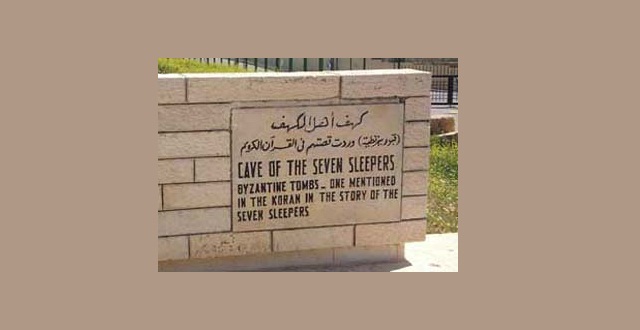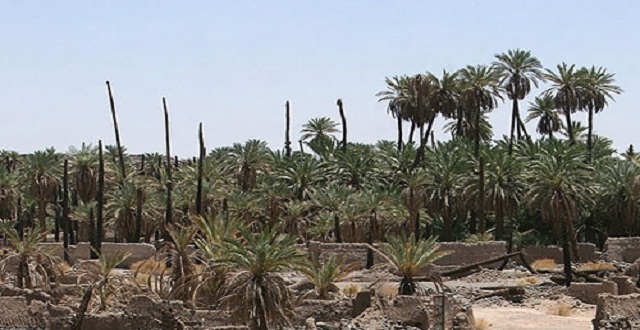
It is possible that some people might harbour scepticism regarding the protracted sleep of the People of the Cave which had extended for years, and consider it to be incompatible with scientific standards and thus look upon it as a myth or legend, since:
Firstly: Such a long life of several hundred years is unlikely for those who are awake, let alone those who are in a state of sleep!
Secondly: Even if we were to accept the possibility of such a long life for one who is awake, it would be inconceivable for one who is asleep. This is because, in this case, the issue of food and nutrition comes to the fore; how is it possible for a person to remain alive for such a long period without food and water? If, supposedly, we were to assume to need one kilo of food and one litre of water per day, more than a hundred tons of food and a hundred thousand litres of water would be required for the life of the People of the Cave, and storing this quantity of food and water within the body is impossible.
Thirdly: Even if we were to overlook all of these, yet, the problem which surfaces is that the stationing of a body under monotonous conditions for such a lengthy period of time harms its physical organism and causes great wastages.
At first glance, these objections might appear to be insurmountable obstacles in the path of this issue. However this is not so, since:
Firstly: The issue of a lengthy life is not one that is unscientific, for we are aware that according to science, the life-span of no living entity possesses fixed and stipulated standards such that when the moment that is reached, death is inevitable.
In other words, while it is true that the physical strengths of man are finite and limited, this does not mean that the body of a man or another living entity does not possess the strength and ability to live longer than what is normal. It does not mean that just as water begins to boil when its temperature is raised to 100 degrees and turns to ice when it is lowered to zero, man likewise, when he reaches the age of a hundred or a hundred and fifty years, his heart necessarily ceases to function and he dies.
Rather, the life-span of living entities is related to the state of their lives, and is completely changeable by altering the lifestyle. A living testimony for this is that on the one hand none of the scientists of the world have set a definite scale for the life of man, while on the other, in the laboratories they have been successful to occasionally increase the longevity of living entities two fold or even several times, and at times increasing it twelve times over. They even assure us that in the future, by means of new scientific techniques, the life-span of man would increase several times more than his present one. The above discussion was in connection with the basic issue of longevity.
Secondly: As far as the issue of food and water during this prolonged sleep is concerned, had this been an ordinary and normal sleep, we would have accepted the protestor’s objection, for then, the issue would have been incompatible with the basic scientific principles.
This is because, despite the fact that the metabolic activity of the body in a state of sleep is much lower than that during wakefulness, however, collectively and over several years it would be very great. However it must be realized that in the world of nature there exist certain states of sleep – in which food consumption is extremely trivial – such as hibernation.
Hibernation
There are numerous animals which sleep all through the winter and undergo what is scientifically referred to as hibernation.
In this kind of sleep, the arterial activities almost come to a standsuntil with only an extremely feeble flame of them remaining alight. The heart almost stops beating, or to state it more correctly, its beatings become so feeble and inconspicuous that it can hardly be sensed.
In such conditions, the body can be compared to a large furnace, which, when turned off, has its pilot light left burning. It is evident that the daily fuel requirement of that furnace for keeping its towering flames alight could possibly cater to the fuel requirements for tens or hundreds of years of that intensely small pilot light (of course, this is dependent upon the flames of the furnace and that of the pilot light).
In connection with the hibernation of some of the animals, the scientists state as follows:
If we were to draw out a frog in hibernation, it would appear dead – its lungs contain no air and its heartbeats are so feeble so as to be imperceptible. Numerous butterflies, insects, earth snails and reptiles are some of the cold-blooded animals that undergo hibernation. Some of the warm-blooded mammals too undergo hibernation. During hibernation, arterial activities greatly decrease and the fat that has been stored in their bodies is slowly consumed.1
Thus, we have a kind of sleep in which the need for food and nutrition is extraordinarily reduced and the principal activities of the body almost come to a standsuntil. Incidentally, this very issue assists to prevent the wear and tear of the organs, and adds to the life of these animals. Essentially hibernation for these animals, which are apparently unable to procure their food during winter, is an invaluable opportunity.
Another Example, Burial of the Aztecs
It has also been observed in the case of Aztecs, that some of them are placed within a coffin before the unbelieving eyes of the amazed onlookers, and at times, buried for a period of even one week. After the conclusion of the period they are taken out and provided massage and artificial respiration in order to help them slowly return to normalcy.
Even if the need for food during this period can be considered to be unimportant, the need for oxygen would surely be vital, for we are aware of the sensitivity of the cerebral cells, especially with respect to oxygen. Their need for this vital element is so great that should they remain deprived of it even for a few minutes, they would perish. Now, how is it that the Aztecs endures the lack of oxygen for, say, a period of around one week?
In the light of the explanation presented by us, the answer to this question is not very difficult. During this period, the principal activities of the body of the ascetic almost comes to a standsuntil as a result of which, the oxygen requirement and consumption of the cells is drastically reduced to such an extent that the air trapped within the coffin is sufficient for nourishing the cells of his body for one whole week!
Freezing The Body of a Living Person
In connection with the issue of freezing the body of animals and even man (for lengthening their life-spans), there exist numerous theories and discussions, some of which have already been realized.
According to these theories it is possible, by placing the body of a man or an animal in sub-zero temperatures below using a special technique, to halt his life without him actually dying and after a period, when necessary, subject him to a suitable temperature and again bring him back to his normal state!
For space travels to far-flung planets which could probably take hundreds or thousands of years, several proposals have been presented, one of them being the idea that the body of the astronaut should be placed in a special container and frozen, and upon nearing the planet under consideration, the temperature within the container should be restored to normal by means of an automatic system. This would cause the astronauts to return to their normal states without having aged!
A leading science magazine reported that recently a book, written by Robert Nielson in connection with freezing the body of man for achieving a long life, has been published and has drawn widespread response in the scientific world.
In an article written in the abovementioned magazine and devoted to this issue, it has been asserted that lately, a new field of science has emerged which deals with this very topic. The article states: “All through the ages, possessing an eternal life has always been one of the deep-rooted and golden dreams of man; however, this dream has presently turned into a reality and is indebted to the wonderful advancements achieved in a new science called cryogenics (a science, which takes man to the icy worlds, preserving him as a frozen body in the hope of a day when scientists return him to life again.)”
Is this logic feasible? Numerous distinguished scientists are working on the issue from various dimensions, and publications such as Life and Esquire, and also newspapers all over the world have intensely debated this concept; and more significant is the fact that a programme is being implemented at this present moment.2
Recently, the newspapers reported that amidst the polar ices – which, as shown by their layers, date back to several thousand years – a frozen fish was found, which, when placed in water of room temperature sprang to life again and began moving around!
It is clear that while frozen the vital systems, unlike during death, do not entirely cease to function, but only become extraordinarily slack.
From all these discussions we infer that it is possible to bring life to a standsuntil or to an extraordinary state of slackness – a possibility, which has been attested by various scientific studies.
In such a state, the consumption of food by the being is almost reduced to zero as a result of which, the small reserves that exist within the body can be sufficient for maintaining its slow life for several long years.
However, the above explanation should not be mistaken to mean that we wish to deny the miraculous nature of the sleep of the People of the Cave; rather, we desire to facilitate a better comprehension of the occurrence by means of scientific explanations.
This is because, without any doubt, the sleep of the People of the Cave was not a common and ordinary sleep like our daily sleep; it was a sleep that was indeed exceptional in nature. Thus, there is no room for astonishment that they (by Allah’s orders) had drifted into a protracted slumber, neither suffering from lack of nutrition nor their physical organs suffering any harm!
Interestingly, from the verses of Suratul Kahf which relate their story, it appears that their sleep differed vastly from normal sleep:
وَ تَحْسَبُهُمْ أَيْقَاظاً وَ هُمْ رُقُودٌ … لَوِ اطَّلَعْتَ عَلَيْهِمْ لَوَلَّيْتَ مِنْهُمْ فِراَراً وَ لَمُلِئْتَ مِنْهُمْ رُعْباً
“And you might think them awake while they were asleep…if you looked at them you would certainly turn back from them in flight, and you would certainly be filled with awe because of them.”3
This verse is indicative of the fact that they were not overcome by an ordinary sleep; rather, they slept – in a manner that made them resemble a dead person – with their eyes kept open!
In addition, the Qur’an says: The sunrays did not enter their cave. And considering the fact that their cave was possibly located on one of the altitudes of Asia Minor in a chilly location, the exceptional nature of their sleep becomes all the more manifest.
On the other hand, the Qur’an says:
وَ نُقَلِّبُهُمْ ذاَتَ الْيَمِينِ وَ ذاَتَ الشِّماَلِ
“And We turned them about to the right and to the left.”4
This reveals that they were not in an entirely monotonous state; mysterious elements, which are suntil unknown to us, would turn them on their sides alternatively (possibly once in a year) so that their bodies do not suffer harm.
Now that this scientific discussion has become sufficiently clear, drawing inference from it with respect to the topic of Resurrection would not demand a detailed discussion for waking up after a prolonged sleep is not totally unlike coming to life after death, and serves to facilitate a better comprehension of the possibility and occurrence of Resurrection.5 and 6
——————————————————————————-
1. An extract from the book Farhangnameh, under ‘zimistankhwabi’
2. The magazine Daanishmand, month of Bahman, Number 47, pg. 4
3. Suratul Kahf (18), Verse 18
4. Suratul Kahf (18), Verse 18
5. For further explanation in this regard, refer the book Ma’ad Wa Jahan Pas Az Marg.
6. Tafsir-e-Namuna, vol. 12, pg. 406










